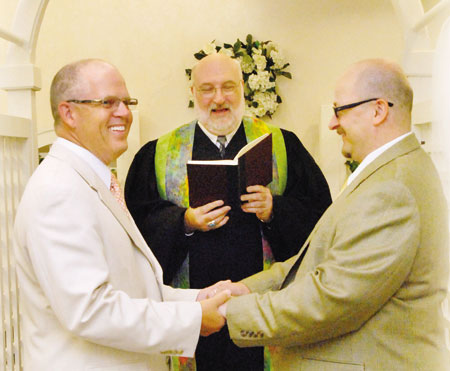
The Supreme Court made history Wednesday with two victories for marriage equality, in California and nationwide.
In a pair of highly anticipated decisions, the divided court effectively undercut California’s Proposition 8 and struck down the federal Defense of Marriage Act, or DOMA. Though one of the decisions was written narrowly, together they provide an emphatic, if incomplete, win for advocates of same-sex marriage.
The decisions, issued on the final day of the term that started last October, address different issues. In each, a slim 5-4 majority rallied for the position that effectively supported same-sex marriage.
“Oh my god, I’m elated,” said Annie Tobin, an art teacher at Gilroy High School. “Not just for myself, but for my students who are gay and lesbian.”
Tobin, who is openly gay, said the Supreme Court’s decision on LGBT rights sent her students the message they needed to hear.
“They aren’t less than, they’re equal,” she beamed. “We want everyone to have the opportunity to get married if they want to.”
Mayor Don Gage said that everyone must now respect the Supreme Court’s decision.
“Whatever’s right is right,” Gage reasoned. “God bless ‘em and let’s move forward.”
The Proposition 8 case involved a challenge to the California ballot measure that banned same-sex marriage. On Wednesday, the court concluded that Prop 8 supporters lacked the legal standing to defend the measure.
Standing is the legal term for being eligible to file a lawsuit. To have standing, an individual must have a significant interest in the controversy and must have suffered an injury or face an imminent threat of injury.
“Because we find that petitioners do not have standing, we have no authority to decide this case on the merits, and neither did the 9th Circuit,” Chief Justice John Roberts Jr. wrote.
Rene Spring and his partner Mark Hoffmann, who reside in Morgan Hill, were legally married by Ken Yeager – president of the Santa Clara County Board of Supervisors. News that a huge hurdle to equality had been removed on the eve of their fifth anniversary was the perfect gift. Still, waiting for the decision hadn’t been easy.
“To be honest, Mark and I were really anxious,” Spring explained.
The couple are “thrilled” that Section 3 of the DOMA has been ruled unconstitutional.
“It will make life a lot less complicated,” Spring laughed.
The separate Defense of Marriage Act case involved a challenge to the 1996 federal law that prohibited same-sex couples who had been married under state laws from obtaining a host of federal benefits. A different majority concluded that portions of the law violated the Constitution.
“DOMA divests married same-sex couples of the duties and responsibilities that are an essential part of married life,” Justice Anthony Kennedy wrote. He joined the court’s four liberal justices in the decision.
Section 3 of the DOMA declares that, for the purposes of providing federal benefits, marriage is “only a legal union between one man and one woman as husband and wife” and a spouse is only a “person of the opposite sex who is a husband or a wife.”
The definition is important because it determines eligibility for a host of federal rights, benefits and privileges.
“It affects every aspect of life,” Justice Ruth Bader Ginsburg said during oral argument.
In the wake of the ruling, the County of Santa Clara has announced that it is ready to provide marriage licenses and ceremonies to same-sex couples as soon as it is authorized to do so – which will likely not take place for at least 25 days – according to a press release.
“I am thrilled that California has achieved marriage equality once again,” said Yeager. “Santa Clara County will proudly marry same-sex couples on the first allowable day. We will be ready to meet the pent-up demand.”
Supervisor Dave Cortese also issued a statement applauding the Supreme Court’s action. He called Wednesday a “historic day for freedom in California,” where thousands of couples will now be able to marry and receive the same protections and federal benefits as heterosexual couples.
“I’m happy to celebrate this day with our LGBT community and look forward to seeing our Santa Clara County employees issue marriage licenses to all those who, until now, have been denied that freedom,” he said.
McClatchy News Services contributed to this report.







